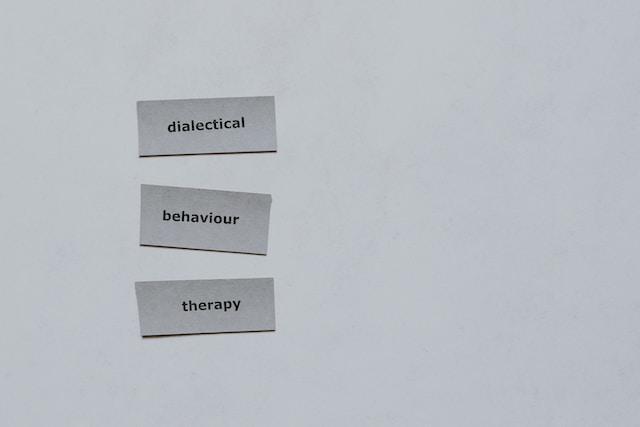Utilizing the Power of Dialectical Practices Therapy (DBT) Providers for Sustainable Emotional Equilibrium and Improved Relationships
In a world where emotional wellness and maintaining healthy partnerships are critical elements of a fulfilling life, the usage of Dialectical Behaviour Treatment (DBT) solutions has become a sign of hope for several people. The structured and evidence-based method of DBT supplies a pathway towards lasting emotional balance and improved interactions with others. By focusing on core concepts, people can establish crucial abilities for controling emotions, improving interpersonal efficiency, and cultivating mindfulness. Nevertheless, real power of DBT lies not just in comprehending these ideas but in the useful application of approaches in every day life. As we navigate the complexities of human feelings and partnerships, utilizing the potential of DBT services ends up being a transformative journey worth exploring even more.
Recognizing the Core Principles of DBT
Dialectical Habits Treatment (DBT) is started upon a set of core concepts that underpin its restorative technique to promoting psychological equilibrium and psychological wellness. Mindfulness is one more core principle of DBT, concentrating on being fully present in the minute without judgment.
Recognition is also indispensable to DBT, highlighting the relevance of acknowledging and approving one's experiences and emotions as legitimate. By incorporating these core principles right into treatment, DBT supplies a reliable and extensive method to advertising emotional well-being and mental resilience.
Developing Psychological Regulation Abilities
Emotional regulation skills are crucial parts of Dialectical Behavior Therapy (DBT) that allow people to properly manage their feelings and navigate challenging circumstances with durability. These abilities encompass the ability to determine and comprehend one's emotions, tolerate distress, control intense sensations, and act based on individual values also in the face of emotional chaos. Establishing emotional policy skills entails learning mindfulness strategies to stay present in the moment, comprehending the triggers that cause psychological dysregulation, and executing coping techniques to modulate psychological actions.

With DBT services, individuals can grow a much deeper recognition of their emotions, recognize patterns of actions that add to emotional distress, and get practical devices to regulate their feelings constructively. By sharpening these skills, individuals can improve their emotional intelligence, improve impulse control, and foster healthier relationships. Ultimately, understanding emotional law causes better psychological security, boosted confidence, and a heightened capability to navigate life's difficulties with calmness and adaptability.
Enhancing Interpersonal Effectiveness

One key element of improving social efficiency in DBT is learning to acknowledge and handle emotions in social interactions (DBT London). By raising psychological internet understanding, individuals can react to others in a more compassionate and understanding way. Additionally, DBT emphasizes the relevance of exercising mindfulness in social relationships, urging people to be existing in their interactions and completely involve with others

Practicing Mindfulness Techniques
Establishing a constant mindfulness technique is crucial for people undergoing Dialectical Behavior modification (DBT) to cultivate psychological law and boost their interpersonal effectiveness. Mindfulness methods, a core component of DBT, include taking note of the here and now moment without judgment. With mindfulness, people can come to be much more mindful of their ideas, feelings, and physical feelings, permitting them to respond to circumstances with better quality and control.

One more essential element of practicing mindfulness in DBT is the principle of extreme approval. Radical approval includes totally embracing fact as it is, also when it is hard or painful. By approving why not try this out the here and now moment without judgment, individuals can minimize their suffering and include favorable change.
Using DBT Strategies in Day-to-day Live
Building upon the foundation of mindfulness techniques such as meditation and extreme approval, individuals can incorporate DBT techniques into their every day lives to cultivate psychological balance and boost their social skills. One effective DBT strategy is making use of dialectics, which encourages individuals to discover the middle ground between 2 opposing thoughts or feelings. By practicing dialectics in daily communications, individuals can discover to confirm their very own feelings while likewise thinking about the perspectives of others. Another essential DBT skill for day-to-day live is distress resistance, which entails finding out exactly how to manage extreme emotions without turning to dangerous actions. This can be continue reading this achieved through techniques such as self-soothing tasks, distraction techniques, or boosting the moment. Additionally, social performance skills educated in DBT can aid individuals communicate their demands assertively, set boundaries, and keep healthy and balanced relationships. By continually applying these DBT strategies in life, people can experience sustainable psychological balance and boost their overall health.
Final Thought
Finally, harnessing the power of Dialectical Behavior Treatment (DBT) solutions can bring about lasting psychological balance and improved connections. DBT London. By comprehending the core concepts of DBT, establishing psychological regulation abilities, boosting social efficiency, exercising mindfulness methods, and using DBT strategies in day-to-day live, individuals can experience substantial improvements in their total well-being and connections. The alternative method of DBT provides beneficial devices and techniques for handling feelings and building much healthier links with others
Emotional regulation skills are vital elements of Dialectical Actions Therapy (DBT) that make it possible for individuals to efficiently handle their emotions and navigate difficult scenarios with strength.Via DBT services, individuals can cultivate a much deeper recognition of their emotions, acknowledge patterns of behavior that contribute to psychological distress, and acquire practical tools to manage their sensations constructively.Creating a constant mindfulness practice is important for individuals undergoing Dialectical Habits Treatment (DBT) to grow emotional law and boost their interpersonal efficiency.Building upon the structure of mindfulness methods such as meditation and radical acceptance, people can incorporate DBT strategies into their daily lives to cultivate emotional equilibrium and enhance their interpersonal abilities. By comprehending the core concepts of DBT, establishing psychological regulation skills, enhancing social effectiveness, practicing mindfulness strategies, and applying DBT approaches in day-to-day life, people can experience considerable renovations in their general wellness and partnerships.